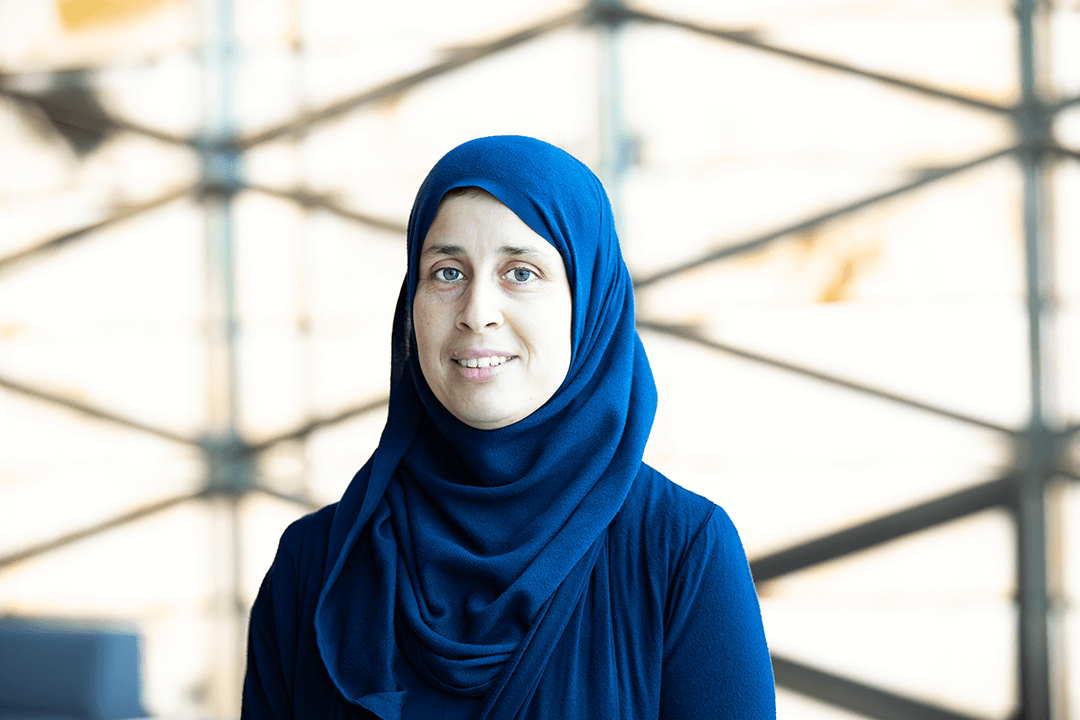Faculty Focus: Taous-Meriem Laleg-Kirati

Associate Professor Taous-Meriem Laleg-Kirati joined KAUST in 2011 after working in France. File photo.
-By A. Ortega, KAUST News
KAUST Associate Professor of Electrical Engineering Taous-Meriem Laleg-Kirati joined the University in 2011 after working as a researcher at INRIA in France.
Laleg-Kirati leads the Estimation, Modeling and ANalysis (EMAN) research group at KAUST, and her interests lie in control theory, system modeling and signal applications. She investigates multiple engineering disciplines and develops mathematical models and algorithms that control processes relying on real-time feedback.
"My research goals [are the development of] effective estimation methods and algorithms to understand complex engineering systems, to extract hidden information and to design control and monitoring strategies," Laleg-Kirati said.
Her research also focuses on physical and biological systems that cannot be investigated with experiments.
"Only few—often indirect—experimental data are available to extract information or to manipulate and control those systems; [we focus] on building robust, fast and low-cost sensing strategies using algorithms [to understand the systems]," she continued.
Laleg's research group includes students, postdoctoral fellows and research scientists from interdisciplinary backgrounds, including electrical engineering and applied mathematics. EMAN members develop mathematical equations and estimation algorithms that build models in complex systems. These models are then simulated to make predictions and to evaluate how the models interact with the rest of the systems.

The University's Associate Professor Taous-Meriem Laleg-Kirati leads the Estimation, Modeling and ANalysis—or EMAN—research group on campus. Image courtesy of EMAN.
Adapting to the future
"My research projects are motivated by real-world problems in engineering and biomedical fields," explained Laleg-Kirati.
For instance, the EMAN group recently developed a real-time control algorithm for a solar membrane distillation system, improving the economic performance and increasing production rates of fresh water while reducing the costs.
"We tested our algorithms in realistic scenarios and we showed that with our controller, the water production increased by over 50 percent [in the simulations and in the scaled-up system dimensions]," she said.
Laleg-Kirati is also implementing artificial intelligence approaches in her traditional model-based research.
"[The combination of] fundamental control and signal processing theory with data-driven approaches, [offers] opportunities in the health-care field, for example," she explained. "[Our algorithms and the existing data] will play a crucial role in advancing health care in general and personalized medicine."
Using a hybrid approach, Laleg-Kirati and her group can overcome data inaccessibility in physiological systems by developing virtual sensors with available measurements and her current estimation tools.

Associate Professor Taous-Meriem Laleg-Kirati noted that her passion for mathematics in high school led her to pursue a 'dream job...play[ing] with mathematical equations,' she said. Image courtesy of Shutterstock.
Passion for mathematics
In a recent interview Laleg-Kirati gave to IEEE Control Systems Magazine, she emphasized her love for mathematics.
"When I was in high school, my favorite subject was mathematics, and my dream was to play with mathematical equations in my future job," she said.
She felt the best way to fulfill her dream was joining an engineering program to do research in applied mathematics, so she obtained a bachelor's degree in control engineering from École Nationale Polytechnique of Algiers; a master's degree in control systems and signal processing from Paris Sud University; and a Ph.D. in applied mathematics from INRIA and Versailles University.
Laleg-Kirati first heard about KAUST in 2008, just as she was starting her postdoctoral fellowship at INRIA. During her application for a faculty position at KAUST, she feared rejection, as she was still somewhat young and inexperienced compared to other candidates.
"However, a group of faculty members from Stanford responsible for the recruitment [pre-interviewed me in Paris and then invited me] for an official interview in Stanford," she explained.
A few months later, she received the offer to join KAUST as a founding faculty member. Laleg-Kirati delayed her arrival at KAUST to give birth to her first daughter and to conclude her contract in France.
"I felt that KAUST was not just a university like others but a real opportunity for any researcher and a unique place in the world to live in," she noted. "[This experience has] impacted positively my personality, my career and my family. [KAUST's international environment is] a unique opportunity for cutting-edge research and...solv[ing] important problems within the Kingdom and also in the whole world. [With my husband,] we decided to try it for a year, and we are still here after nine years!"
Related stories:
- Electronics conference gives a positive charge
- KAUST Associate Professor Taous-Meriem Laleg-Kirati finalist at Leadership Excellence for Women Awards & Symposium
- 'Super Women in Science' returns
- Successful women in science and engineering
-
Lifting up female scientists

